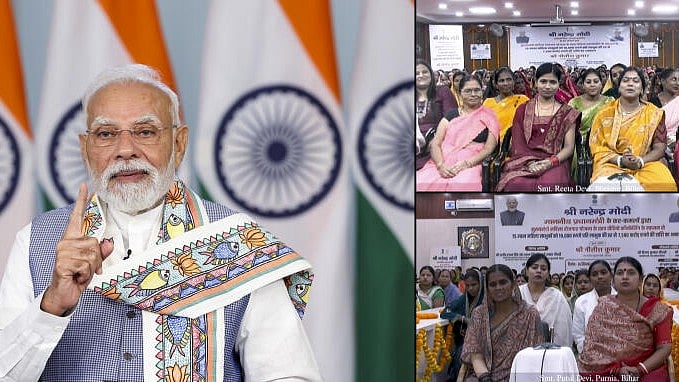
Prime Minister Narendra Modi speaking after virtually launching Bihar's Mukhyamantri Mahila Rojgar Yojana via video conferencing from New Delhi on September 26, 2025.
Credit: PTI Photo
In July 2022, Prime Minister Narendra Modi, while inaugurating the Bundelkhand Expressway in Orai, Uttar Pradesh, warned against the practice of distributing freebies for votes, calling this ‘revdi culture’ ‘very dangerous’ for India’s development. His words resonated with economists and taxpayers worried about fiscal health.
Yet, three years later, the same culture has not only persisted but become institutionalised, with parties — including the Bharatiya Janata Party (BJP) — competing in electoral auctions of subsidies, waivers, and cash transfers.
The latest example is a ₹7,500-crore sop to women ahead of the Bihar elections, raising the obvious question: has Modi’s critique been reduced to rhetoric, where he’s embracing the very politics he denounced? Even the Supreme Court has repeatedly warned that freebies threaten both financial stability and democratic health.
The rot is visible in States. Karnataka’s 2023-2024 Budget introduced ‘guarantees’ like 200 units of free power, free bus travel for women, and cash transfers, costing ₹95,450 crore since their inception. Himachal Pradesh, already burdened with debt projected at ₹1.03 lakh-crore by 2025-2026, has worsened its crisis through free electricity, water, stipends, and the Old Pension Scheme, leaving a fiscal deficit of about 4 per cent of GSDP. Haryana, once a high-growth hub, is crippled by farm power subsidies and waivers, with debt crossing 26 per cent of GSDP, and investment stagnating. Maharashtra, too, has drifted into populism, with farm loan waivers and subsidies pushing debt towards ₹9.32 lakh-crore by 2025-2026, squeezing funds for infrastructure.
The fallout of this is unmistakable. First, mounting debt has left States like Punjab, Rajasthan, and Haryana trapped in unsustainable borrowings, while Bihar’s new sops threaten to weaken its credit profile. Second, priorities are distorted: money that should fund schools, healthcare, and skills is locked into subsidies — Bihar spends around 3 per cent of GSDP on health and education, far below the national average.
Third, it creates a moral hazard, conditioning citizens to expect handouts instead of jobs, infrastructure, or reforms. Fourth, private investment suffers as States cut capital spending. Finally, excessive subsidies in food, power, and fuel distort markets and risk inflation, ultimately hurting the poor. The challenge ahead lies in balancing welfare with fiscal prudence, lest India’s economy slide into a structural crisis.
Women voters: BJP’s silent calculation
A striking feature of the BJP’s strategy has been wooing women voters through freebies — free LPG cylinders, cash transfers, subsidised rations, and now income support. This has worked electorally: in Uttar Pradesh 2022, Madhya Pradesh 2023, and local polls, women turned out strongly for the BJP. But this success comes at a cost. Instead of empowering women through education, healthcare, and jobs, the party has relied on subsidies that give relief but no structural transformation.
Bihar’s ₹7,500-crore giveaway
Marketed as empowerment, these sops threaten to deepen fiscal strain as the State already runs a deficit near 3 per cent of GSDP, has public debt at 38 per cent, and depends heavily on Central transfers. Another round of borrowing risks choking funds for roads, irrigation, and industry, the very levers of growth that Bihar needs.
The persistence of revdi politics highlights structural gaps. India lacks fiscal rules to distinguish long-term welfare from short-term bribes, leaving States free to indulge in giveaways. Modi’s warnings ring hollow as his party too joins the race, while taxpayers, burdened with GST and income taxes, resent funding sops. Without political will and institutional reform, the freebie spiral will weaken India’s federal economy.
The tragedy is that real priorities — floods, landslides, and climate-linked disasters — rarely receive the urgency or funds that poll-time giveaways enjoy. Rehabilitation, ecological safeguards, and infrastructure resilience are sidelined, even as populist schemes expand.
The politics of contradiction
When Modi attacked the revdi culture, he rightly called it a national danger — a slippery slope where politics degenerates into competitive bidding, destroying fiscal stability. But the record shows that the BJP has deepened the same culture. If freebies continue unchecked, India risks a vicious cycle of rising debt, falling investment and weakening faith in sustainable growth.
The challenge before Modi is to show courage and dismantle revdi politics — starting with his own party. Until then, freebies will remain the most dangerous contradiction of ‘New India’.
K S Tomar is a Shimla-based senior political analyst. X: @Toruhp.
(Disclaimer: The views expressed above are the author's own. They do not necessarily reflect the views of DH.)